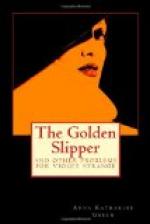In a transport of hope I rushed for the dim entrance the children had pointed out and flew up to her room. As I reached it, I heard a trill as perfect as Tetrazzini’s. The singer was Theresa; there could be no more doubt. Theresa! exercising a grand voice as only a great artist would or could.
The joy of it made me almost faint. I leaned against her door and sobbed. Then when I thought I could speak quite calmly, I went in.
Roger, you must understand me now,—my desire for money and the means I have taken to obtain it. My sister had the makings of a prima-donna. Her husband, of whose ability I had formed so low an estimate, had trained her with consummate skill and judgment. All she needed was a year with some great maestro in the foreign atmosphere of art. But this meant money—not hundreds but thousands, and the one sure source to which we might rightfully look for any such amount was effectually closed to us. It is true we had relatives—an aunt on our mother’s side, and I mentioned her to Theresa. But she would not listen to the suggestion. She would take nothing from any one whom she would find it hard to face in case of failure. Love must go with an advance involving so much risk; love deep enough and strong enough to feel no loss save that of a defeated hope. In short, to be acceptable, the money must come from me, and as this was manifestly impossible, she considered the matter closed and began to talk of a position she had been offered in some choir. I let her talk, listening and not listening; for the idea had come to me that if in some way I could earn money, she might be induced to take it. Finally, I asked her. She laughed, letting her kisses answer me. But I did not laugh. If she had capabilities in one way, I had them in another.
I went home to think.




